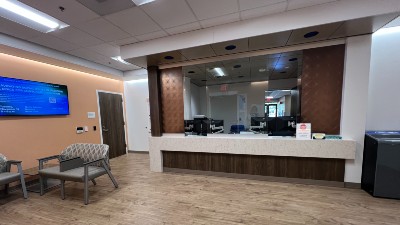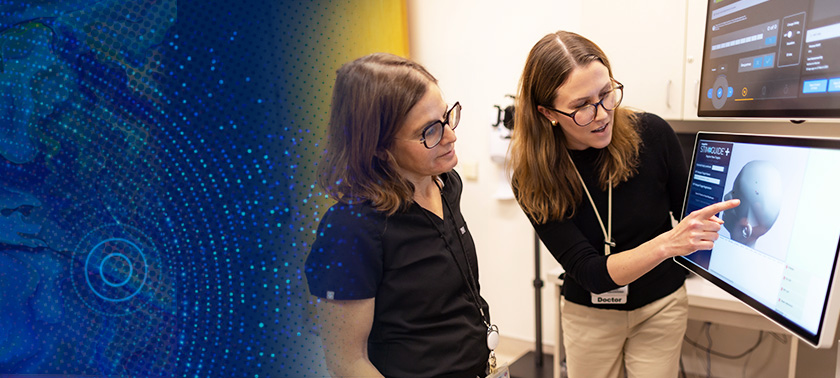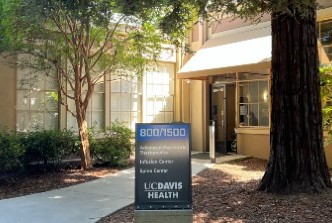Advanced Psychiatric Therapeutics Clinic

The Advanced Psychiatric Therapeutics (APT) Clinic at UC Davis Health offers novel treatments for difficult-to-treat depression. The clinic currently offers the following therapies:
- Transcranial Magnetic Stimulation (TMS)
- Esketamine (brand name Spravato®), a prescription nasal spray treatment
The clinic is located at 3301 C Street, Suite 800 B, Sacramento, CA 95816.
Free parking is available in the front and back of the complex.
How to Refer
We are happy to accept referrals from psychiatric care providers.
To refer a patient to the APT Clinic, please complete the referral form and fax to 916-551-2797. Please review the referral form for eligibility information.
Our Patient Care Team
Our APT Clinic team includes eight TMS-certified psychiatrists providing treatment supported by a patient care team that includes a psychiatric nurse practitioner, a nurse manager, and TMS technicians.
To learn more about the clinic and treatments available to patients:
What is TMS therapy?
Learn more about Transcranial Magnetic Stimulation (TMS) and its use in treating depression.
Transcranial magnetic stimulation (TMS) is a breakthrough treatment that noninvasively delivers magnetic pulses to the brain. The magnetic pulses activate nerve cells in targeted areas of the brain. Over time, repeated treatments restore normal patterns of brain activity. TMS works differently than medications and can relieve symptoms of depression even when medications have not been effective.
What to Expect With Treatment
TMS typically involves five to six weeks of daily treatment (Monday-Friday), sometimes followed by a taper phase with one to three treatments per week. Treatment sessions are usually less than one-half hour. Patients are awake and alert throughout the treatment and may return to normal activity immediately after treatment.
TMS is approved by the U.S. Food and Drug Administration (FDA) for the treatment of Major Depressive Disorder in adults whose depression symptoms have not responded to medications.
TMS is sometimes used to treat other neuropsychiatric conditions as well.
Clinical trials and years of real-world experience have clearly established the efficacy of TMS. About one in two patients seeking treatment for depression will experience meaningful improvement in their symptoms, while one in four will experience resolution of depression symptoms.
Yes. Millions of TMS treatments have been administered since it was first approved by the FDA in 2008.
The most common side effects are discomfort at the stimulation site during treatment or a mild headache after treatment. These side effects usually improve after the first few treatments.
TMS avoids many of the undesirable side effects of antidepressant medications, such as weight gain and sexual dysfunction.
Most major insurance plans cover TMS treatment for Major Depressive Disorder.
Generally, treatment is covered only when standard treatments have not provided relief. Each insurance plan has its own criteria. Our clinic staff will help determine whether your treatment is covered by insurance.
If you are over the age of 18 and suffer from Major Depressive Disorder that has not responded to standard treatments, you may be a good candidate for TMS treatment.
Please note that TMS is not safe for people with epilepsy or with metal implants in their head or neck.
What is esketamine (brand name Spravato®) therapy?
Esketamine (brand name Spravato®) is approved by the U.S. Food and Drug Administration (FDA) as an antidepressant medication that is administered as a nasal spray.
The active ingredient in Spravato® is esketamine hydrochloride. This is one of two molecules that makes up ketamine, an anesthetic agent that has been found to have rapid-acting antidepressant effects.
Spravato® is FDA-approved to treat adults with Major Depressive Disorder who have not responded to two or more antidepressant medications, or who are experiencing suicidal thoughts. Spravato® is to be used in combination with an oral antidepressant medication.
What to Expect With Treatment
Due to the potential for serious side effects, including dissociation and sedation, Spravato® is administered in a health care setting. After each dose of Spravato®, patients must be monitored in clinic for two hours. Patients are not permitted to drive after treatment and will need to arrange transportation home from clinic.
Spravato® is the first antidepressant approved in decades that works differently than other antidepressant medications. Spravato® affects the glutamate system in the brain, while most antidepressants affect serotonin or norepinephrine.
Spravato® can help even when other antidepressants have not. For some people, Spravato® works more rapidly than other antidepressants.
Spravato® has been approved by the U.S. Food and Drug Administration and is generally safe when administered in a health care setting. Patients are monitored for two hours after each dose because Spravato® has the potential to cause serious side effects for several hours following administration, including sedation (drowsiness), dissociation (feeling disconnected from your thoughts, feelings, or body; feeling disconnected from space or time), or increased blood pressure.
You should also know that Spravato® has the potential for dependence, misuse, or addiction.
Most major insurance plans cover Spravato® for adults with Major Depressive Disorder who have not responded to standard treatments. Each insurance plan has its own criteria. Our clinic staff will help determine whether your treatment is covered by insurance.
If you are over the age of 18 and suffer from Major Depressive Disorder that has not responded to standard treatments, you may be a good candidate for esketamine therapy.


